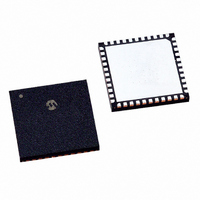PIC18F46J50-I/ML Microchip Technology, PIC18F46J50-I/ML Datasheet - Page 345

PIC18F46J50-I/ML
Manufacturer Part Number
PIC18F46J50-I/ML
Description
IC PIC MCU FLASH 64KB 44-QFN
Manufacturer
Microchip Technology
Series
PIC® XLP™ 18Fr
Specifications of PIC18F46J50-I/ML
Program Memory Type
FLASH
Program Memory Size
64KB (32K x 16)
Package / Case
44-QFN
Core Processor
PIC
Core Size
8-Bit
Speed
48MHz
Connectivity
I²C, SPI, UART/USART, USB
Peripherals
Brown-out Detect/Reset, DMA, POR, PWM, WDT
Number Of I /o
34
Ram Size
3.8K x 8
Voltage - Supply (vcc/vdd)
2.15 V ~ 3.6 V
Data Converters
A/D 13x10b
Oscillator Type
Internal
Operating Temperature
-40°C ~ 85°C
Processor Series
PIC18F
Core
PIC
Data Bus Width
8 bit
Data Ram Size
3 KB
Interface Type
I2C, SPI
Maximum Clock Frequency
8 MHz
Number Of Timers
2
Operating Supply Voltage
2 V to 3.6 V
Maximum Operating Temperature
+ 85 C
Mounting Style
SMD/SMT
3rd Party Development Tools
52715-96, 52716-328, 52717-734, 52712-325, EWPIC18
Development Tools By Supplier
PG164130, DV164035, DV244005, DV164005, PG164120, DM183032, DV164136, MA180024, DM183022
Minimum Operating Temperature
- 40 C
On-chip Adc
10 bit, 13 Channel
Package
44QFN EP
Device Core
PIC
Family Name
PIC18
Maximum Speed
48 MHz
A/d Bit Size
10 bit
A/d Channels Available
13
Height
0.88 mm
Length
8 mm
Supply Voltage (max)
3.6 V
Supply Voltage (min)
2.15 V
Width
8 mm
Lead Free Status / RoHS Status
Lead free / RoHS Compliant
For Use With
AC164322 - MODULE SOCKET MPLAB PM3 28/44QFN
Eeprom Size
-
Lead Free Status / Rohs Status
Lead free / RoHS Compliant
Available stocks
Company
Part Number
Manufacturer
Quantity
Price
Company:
Part Number:
PIC18F46J50-I/ML
Manufacturer:
Microchip Technology
Quantity:
1 830
Part Number:
PIC18F46J50-I/ML
Manufacturer:
MICROCHIP/微芯
Quantity:
20 000
- Current page: 345 of 554
- Download datasheet (9Mb)
After the A/D module has been configured as desired,
the selected channel must be acquired before the
conversion is started. The analog input channels must
have their corresponding TRIS bits selected as an
input. To determine acquisition time, see Section 20.1
“A/D Acquisition Requirements”. After this acquisi-
tion time has elapsed, the A/D conversion can be
started. An acquisition time can be programmed to
occur between setting the GO/DONE bit and the actual
start of the conversion.
The following steps should be followed to do an A/D
conversion:
1.
FIGURE 20-2:
© 2009 Microchip Technology Inc.
Configure the A/D module:
• Configure the required ADC pins as analog
• Set voltage reference using ADCON0
• Select A/D input channel (ADCON0)
• Select A/D acquisition time (ADCON1)
• Select A/D conversion clock (ADCON1)
• Turn on A/D module (ADCON0)
pins using ANCON0, ANCON1
Legend: C
V
AIN
R
S
V
I
R
SS
C
R
LEAKAGE
T
PIN
IC
HOLD
SS
ANALOG INPUT MODEL
ANx
C
5 pF
PIN
= Input Capacitance
= Threshold Voltage
= Leakage Current at the pin due to
= Interconnect Resistance
= Sampling Switch
= Sample/Hold Capacitance (from DAC)
= Sampling Switch Resistance
various junctions
V
DD
V
V
T
T
= 0.6V
= 0.6V
PIC18F46J50 FAMILY
I
±100 nA
LEAKAGE
2.
3.
4.
5.
6.
7.
R
IC
Configure A/D interrupt (if desired):
• Clear ADIF bit
• Set ADIE bit
• Set GIE bit
Wait the required acquisition time (if required).
Start conversion:
• Set GO/DONE bit (ADCON0<1>)
Wait for A/D conversion to complete, by either:
• Polling for the GO/DONE bit to be cleared
OR
• Waiting for the A/D interrupt
Read A/D Result registers (ADRESH:ADRESL);
clear bit, ADIF, if required.
For next conversion, go to step 1 or step 2, as
required. The A/D conversion time per bit is
defined as T
required before next acquisition starts.
≤ 1k
SS
Sampling
Switch
V
DD
AD
R
SS
. A minimum wait of 2 T
Sampling Switch
1
V
SS
C
2
HOLD
3
DS39931C-page 345
= 25 pF
(kΩ)
4
AD
is
Related parts for PIC18F46J50-I/ML
Image
Part Number
Description
Manufacturer
Datasheet
Request
R

Part Number:
Description:
Manufacturer:
Microchip Technology Inc.
Datasheet:

Part Number:
Description:
Manufacturer:
Microchip Technology Inc.
Datasheet:

Part Number:
Description:
Manufacturer:
Microchip Technology Inc.
Datasheet:

Part Number:
Description:
Manufacturer:
Microchip Technology Inc.
Datasheet:

Part Number:
Description:
Manufacturer:
Microchip Technology Inc.
Datasheet:

Part Number:
Description:
Manufacturer:
Microchip Technology Inc.
Datasheet:

Part Number:
Description:
Manufacturer:
Microchip Technology Inc.
Datasheet:

Part Number:
Description:
Manufacturer:
Microchip Technology Inc.
Datasheet:











